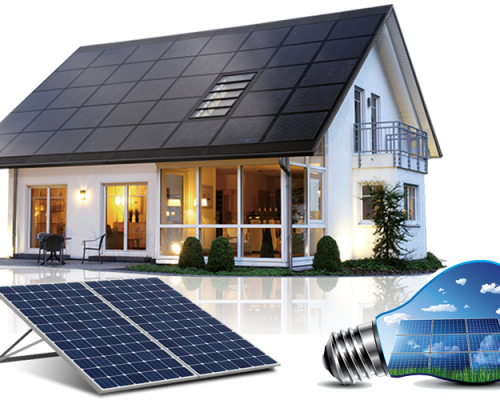Know Hows
List of Content
Who can use Solar Systems?
Using the power of the sun is becoming increasingly attractive from an economic and environmental aspect. It is the unlimited source of energy spreading equally amongst the world.
Variety of consumers like owners of residential buildings, commercial or industrial entrepreneurs or public utility service providers, can use solar in many ways and add to their savings for lifetime every year. If you are residing in a rural area or some remote location, Solar is the best and economical solution to your electricity needs.
Major classification, where solar power can be utilized is provided here;
- Residential Solar
- Independent House
- Farm House
- Housing Society
- Commercial Solar
- Malls or Shopping Complexes
- Petrol Pumps
- Highways Toll Plazas
- Telecom Towers
- Corporate offices
- Roofs of Shops
- Stadiums, Clubs, Golf Courses
- Hospitals
- Hotels, Resorts and Banquet Halls
- Industrial Solar
- Small Scale Industries
- Medium Scale Industries
- Large Scale Industries
- Institutions and Government/PSUs
- Ashrams, Yoga Centres, Religious Institutes
- Schools, Colleges
- Municipal Corporations, Smart Cities
- Police Stations, Police Lines
- Railway stations, Metro
- Airports
- Bus stands, Bus stops
- Agriculture
You can use your house roof or building roof or available land for ground mounted solar or your Car parking sheds for solar installation. Now days, even walls elevated structures are also being used for solar installation to keep your roof accessible.
Solar system – Choosing right type for right application
Every electricity consumer has a different load profile like maximum power consumption during day time or night, Fixed power cuts/outages, Holidays & weekly offs in case of commercial or industrial units etc. Point to be relaxed here is that our solar systems can be fully customised according to your load profile and energy requirements. Design of your Solar system depends on all these factors.
Generally, Solar systems can be categorised as below;
- On-Grid System
This type of systems, are connected with your building’s main electricity supply from your local DISCOM. Here, your solar system can be connected to your mains electric supply solely or in combination with other power sources like battery banks.
- Hybrid Solar Systems
Such Solar systems are combined with your other electricity generating equipments like generators or inverters. No doubt, you can include battery banks also as a power backup option.
- Off-Grid System
Off-grid solar power systems are equipped with battery banks where excess generated surplus energy can be stored for later usage during night hours and does not need to be connected to your main electric supply from DISCOM. Such type of systems, are widely used for Traffic signals, Street lights, water pumps for irrigation and backup power for houses etc in localities where grid connectivity is not available.
If you have grid connectivity, conventionally, On-Grid solar systems are highly recommended due to its minimal maintenance requirements and maximum returns. These fulfil your energy requirements more economically and provide flexibility of using a grid-hybrid system also where you can store electricity in batteries for night time loads.
For schools or offices, you can opt for Net-Metering mechanism where extra generated electricity will be supplied to DISCOM during holidays or weekends.
For more detailed analysis of cost, savings, finance and buying options, Contact Us NOW!
How you want to use Solar Power relies on you
- Under CAPEX model, you own the solar system and the power generated by the system is free for you for lifetime.
- You buy only solar power in RESCO model. Solar system is owned by your solar provider or any 3rd you will be paying only for the power consumed by you and your solar tariff will be obviously lower compared to the grid tariff as determined in your power purchase agreement (PPA).
Know your Roof
Solar systems can be installed on almost any type of roof i.e. flat roof, sloping roofs, RCC roofs, metal sheds etc. Most roof types in our country are suitable for solar installation. However, in case your building is too old, this is recommended to get the stability verification of your roof by some experts.
You can perform a short validation of your roof to check its suitability for solar installation. Below listed are major factor to be considered for validation of your roof for solar installation;
- Available Space on roof
Amount of space required for solar installation depends on size of the system, efficiency, specifications and type of solar panels being used and location of installation i.e. Space required for solar installation in northern India will be slightly more compared to locations in southern India.
Typically, for 1 kW solar rooftop system, it requires approx 10 Sq. meters (110 square feet) area. Based on the space availability, you can fulfil your electricity requirement through solar.
Based on availability of excess space on your roof, you can increase your system size anytime if your energy needs increases in future.
- Type of Roof
Solar systems can be installed on almost any type of roof i.e. flat roof, sloping roofs, RCC roofs, metal sheds etc. Irrespective of the material used for construction of your roof like RCC, Cement sheets or tiles, fibre or metallic sheets and wood etc, solar installation is possible for all types.
Most Indian roofs are flat and are ideal for deploying solar power systems but if your roof is sloped, roof orientation and tilt angle of solar panels must be checked.
- Strength of Roof
Most roof types in our country are suitable for solar installation. However, in case your building is too old, this is recommended to get the stability verification of your roof.
Generally, a Solar PV system weighs about 15 to 20 Kg per square meter. This weight can be easily borne by most roofs. Just ensure that your roof quality is good enough to support the solar power system for next 25 years minimum.
- Roof Orientation
This is vital point to check the orientation in case you have a sloped roof. Typically, south facing orientation in sloping roofs is considered as best suitable for solar installation. Slop angle also, has a major impact on the performance of your solar system.
- Shadow of Objects on Your Roof
This is self explanatory that sunlight is the fuel for any type of solar power system and any object causing shadow on solar panels (however, even if shadow may be for a small interval) will obviously reduce the power generation and hence efficiency of your solar system.
Hence, it is important to assess your roof thoroughly to get maximum efficiency from your solar power system for a life of 25 years or more. Inframitra performs in depth assessment of your roof by its professional experts using advanced tools. To get your roof assessed, Contact Us NOW!Costing & Financing for Solar System
- Cost of my Solar PV System
Since your solar tariff decreases by increase in system size, solar PV system prices are directly influenced by the type and size of the system.
Below table indicates tentative cost for different sizes of grid-connected rooftop solar systems;
Above cost is derived considering standard site conditions along with supply of Tier-1 quality equipments and our best optimised system designs. These prices were updated on 28-Oct-2021 and stand effective till 31-Mar-2022. Since, GOI has imposed some surplus duties and taxes taking effect from 1-Apr-2022, updated figures may slightly vary according to taxes, your location and actual site conditions.
Please check our Solar Calculator to fetch the solar system cost relevant to your requirement.
- Financing options for my Solar PV System
There are multiple Financing Options for your Solar PV System as indicated in below table;
Solar PV System loans have been kept under Priority Sector lending category as per RBI mandate, where loan amounts up to INR 10 Lacs can be availed for residential solar systems and a company can avail up to INR 30 Cr of loan for setting up of larger solar power plants.
For rural and agricultural solar systems, there are many Government schemes and micro finance agencies are available. Contact Us, to know more details on these options.
Savings with Solar
No doubt, solar power is much cheaper when compared with grid supplied electricity. Electricity tariff in our country keep increasing every year constantly. For example, if your current grid tariff is Rs. 7 per kWh (Unit) and increases at a constant rate of 5% per annum, you will be paying Rs. 24 per kWh after 25 years.
On the other side, by adopting solar power, your power cost will be fixed for the life time. Moreover, solar earns you in form of financial saving which is completely tax free. Your decision of Going Green by adopting solar power may reduce your electricity expense by 30% to 70% depending on your location, grid tariff, size of your solar system and your consumer category etc.
You can check detailed saving potential of your solar power system using our Solar Calculator.
Guarantees and Warranties
For solar power systems, most manufacturers supply their equipments backed with guarantees and warranties. One should check and finalize these guaranties and warranties on various components with solar system provider before signing the purchase contract. Few of important points are highlighted below;
- Solar Panels: Generally major module manufacturing brands serve 10 years warranty on manufacturing defects. Additionally, a performance guarantee (linear generation guarantee) of 25 years is served by module manufacturers, where linear generation guarantee terms highlights the degradation trend of solar panels. In any case, 1st year degradation should not be greater than 2% and total degradation during entire life of 25 years should not be more than 19% in any case.
- Inverters: Major inverter brands offer 5 years of warranty. However, extended warranties for up to 20 years can be availed, by paying some nominal charges.
- MMS (Module Mounting Structure): Typically, module mounting structures are backed with manufacturer warranty of 5 years against any manufacturing defects.
- Solar System Warranty: Solar companies provide a workmanship warranty of 1 year on solar system and even more for some specific cases. This warranty covers repair and replacement against any manufacturing defects and any kind of defects in engineering or defects arising due to defective engineering.
- Plant Performance Guarantee: Usually, solar companies provide a plant performance guarantee of 1 year for solar systems or even more for some specific cases. PR (Performance Ratio) based on CUF (Capacity Utilisation Factor) can be determined and highlighted in Purchase Contract Agreement for this purpose.
Comprehensive service and maintenance packages offered by Inframitra, automatically extends your Plant Performance Guarantee, if opted for.
Insurance for my Solar System
Now a day, major insurance companies provide insurance policies to insure your Solar system. These policies usually insure your solar system from the threats of fire and burglary, machinery breakdown and other natural calamities as per the details of the policy.
Since adopting solar needs a considerable investment and you will reap its returns over a period of 25 years, it is therefore important that you insure your solar system. In this regard, to help our customers, Inframitra offers comprehensive service and maintenance packages to our clients at very nominal price. These packages include insurance of solar system, warranty, breakdown maintenance, preventive maintenance, regular cleaning, system performance monitoring support etc. to our clients. With the help of these packages, our clients can keep their solar investment safe for the complete 25 years of their solar journey.
To know more about these packages and to get your solar system insured you can get in touch with our Customer Care, Team at info@inframitra.in or +91-175-518-1800
Solar Subsidy and Incentives
Government of India, through its State Governments provide various types of incentives on rooftop solar power plants. Following is the major classification of such incentive schemes;
- Capital Subsidy: In present scenario, there is a considerable drop has been recorded in cost of solar power systems and are no more depending on subsidies for financial feasibility. Still, for some specific cases, central government through Ministry of New & Renewable Energy provides a conditional capital subsidy for investments made in solar power plants. This policy offers 30% subsidy on total cost of solar system and mandates the use of “Made in India” equipments procured from officially recommended brands to be eligible for this facility.
- Priority Sector Lending: Reserve Bank of India (RBI) has released a notification where solar power systems are included under priority sector lending category. [Ref. Link],
Bank loans up to a limit of Rs 30 Cr to commercial and industrial sector for solar power systems and for non-conventional energy based public utilities, for example street lighting systems and remote village electrification etc, will be eligible for Priority Sector classification. For individual households, the loan limit will be Rs 10 Lac per applicant.
Statutory Approvals and Permits
However, there are no such approvals or permits required if you are going to install off grid Solar system or grid connected system for self consumption. But, for net metering and gross metering system, few permits and approvals are required. List of approvals and its process varies from state to state and based on type and size of solar system. General requirements are as listed below;
- Approval from local grid office (DISCOM) for grid connectivity.
- Usually, for solar power systems of size 10 KWp and above (size may vary from state to state), approval from CEIG (Chief electrical inspector to the government of state) before and after installation of the system.
Process to Apply for Net or Gross Metering
- Submission of application along with applicable fee and details of proposed rooftop solar plant to local DISCOM (Grid supply office).
- Local DISCOM will conduct a feasibility check for proposed rooftop solar power plant and based on report, may reject or approve the proposal.
- After receipt of approval from DISCOM, an application for registration of the solar power plant will be submitted to DISCOM.
- Interconnection agreement will be signed between DISCOM and the project owner.
To know more detailed process click here.
Get Upgrade towards Green Energy with
Your Trusted Companion on Your Solar Journey
We serve every electricity consumer as a solar friend and mentor, be it individual house owner or housing societies, small or large industries, commercial institutions or schools, colleges and hospitals.











